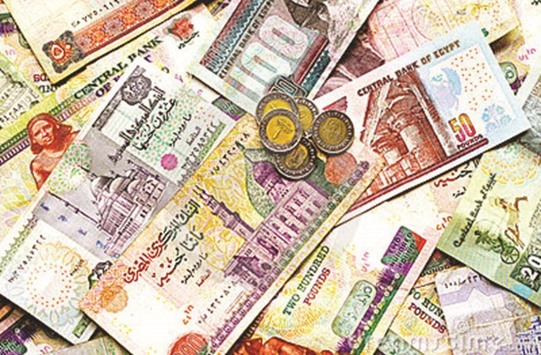The Egyptian pound fell to a record low on the black market on speculation that policymakers will weaken the official exchange rate for the second time this year.
The currency dropped to 12.99 per dollar, according to the average quote of four dealers surveyed by Bloomberg in Cairo yesterday. That’s a 1.9% decline from a week earlier and the weakest on record since the weekly poll began in 2013.
Dollars are becoming more expensive to buy for people and businesses in North Africa’s biggest economy amid a shortage in supply due to slumping tourism and exports. As officials seek approval from the International Monetary Fund for a $12bn loan, analysts and investors are forecasting the government will end the pound’s six-month-old peg to the dollar by devaluing the local currency in the banking system or floating it.
“The general feeling is that devaluation is imminent,” said Hany Farahat, senior economist at CI Capital, a subsidiary of Commercial International Bank in Cairo. “The black market premium will peak once devaluation occurs and will only start falling when foreign currency liquidity improves and capital controls are removed. Only then will the two rates converge.”
President Abdel-Fattah El-Sisi pledged in a televised speech on Monday to increase government supplies of basic goods over the next two months “regardless” of the exchange rate.
El-Sisi’s remarks are “psychological preparation for a floatation” of the pound, said Hany Genena, head of research at Cairo-based investment bank Beltone Financial, in an e-mailed report. Genena expects the central bank to float the pound no later than October 6.
The pound’s 12-month non-deliverable contracts traded near a record 12.65 per dollar as of 6:16pm in Cairo, compared with 12.55 last Tuesday. Trading of EFG-Hermes Holding stock, which investors have been buying in local currency and selling in London for dollars, gives an implied exchange rate of 13.25 pounds per dollar.
Egypt last devalued the pound in March, letting it drop by 13% – the single biggest depreciation in more than a decade. Policymakers, citing a need to attract investment, end dollar shortages and boost the economy, promised a “more flexible exchange rate.” The central bank, however, has yet to follow through on its pledges.
Money changers taking part in the Bloomberg survey asked not to be identified because they are discussing trading outside price limits set by central bank, which is illegal.

The Egyptian pound dropped to 12.99 per dollar, according to the average quote of four dealers surveyed by Bloomberg in Cairo yesterday. That’s a 1.9% decline from a week earlier and the weakest on record since the weekly poll began in 2013.
